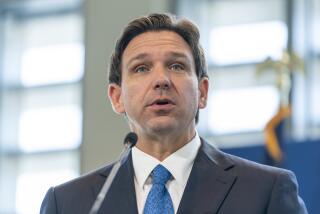Florida Judge Clears Way for Tobacco Trial
- Share via
WEST PALM BEACH, Fla. — A Palm Beach County Circuit Court judge on Wednesday turned down a request by the tobacco industry to throw out a massive lawsuit that seeks more than $1 billion to compensate the state of Florida for money spent treating sick smokers.
The ruling in the closely watched case paves the way for a trial to begin next month.
In making his decision, Judge Harold J. Cohen rejected contentions by tobacco industry lawyers that the state cannot prove that it was financially damaged by the alleged misconduct of the cigarette companies. He also rebuffed arguments that the statistical models the state plans to use to prove its case are fatally flawed.
The rulings mean the state will be able to go forward with a case based largely on statistical evidence about the health hazards of smoking, rather than having to prove that 860,000 Medicaid recipients actually were injured by smoking--a daunting, if not impossible, task.
Cohen’s decision comes less than two weeks after a group of state attorneys general announced that they had forged a huge settlement of 40 Medicaid suits and nearly 20 private class-action suits against the industry for $368.5 billion. The industry also agreed to major curbs on its advertising and marketing practices in exchange for caps on its future liabilities and a bar on punitive damages and class actions in the future. Because of those restrictions on lawsuits, the settlement must be approved by Congress, a process that could take the remainder of the year.
However, Cohen has said he will not delay the trial while Congress is debating the merits of the settlement. Florida and industry officials had said they hoped the case could be resolved before trial, but that now appears unlikely.
In issuing both rulings Wednesday, Cohen stressed that Florida had enacted a law in 1994 especially designed to make it easier for the state to recover taxpayers’ costs of treating residents with smoking-related illnesses.
The Florida Supreme Court upheld most of the controversial statute last year, saying it was “a rational response to a public need.” Referring to that court decision, Cohen said, “I’m told to construe the code liberally and that statistical evidence can be used.”
Earlier this week, Murray Garnick, a Washington lawyer who represents Philip Morris, argued that even if Florida could prove its allegations that the cigarette companies had marketed a product that they knew would make people ill, the state could only show that it was injured indirectly and therefore should not be able to recover damages.
W.C. Gentry, a Jacksonville, Fla., attorney who is one of the state’s special counsels, retorted on Tuesday that the 1994 law gave the state a cause of action against the companies, independent of any suit a smoker might file.
“Florida has a unique statute,” Gentry argued. The cigarette companies “sold an unreasonably dangerous product. It caused diseases. Florida had to pay to treat those diseases. Florida was injured. End of story.”
Gentry said he was cheered by the ruling and thinks Florida has an excellent chance of winning the case because “the evidence of misconduct by these companies is overwhelming.”
But Garnick said he was pleased that the judge had winnowed out parts of the case, and he said he feels the companies could prevail at trial.
In recent days, Cohen has also ruled that Florida cannot:
* Seek damages from the cigarette companies for fraud prior to 1982.
* Recover punitive damages on the two counts of the case stemming from the 1994 law, because that statute was passed only to help the state recover expenses.
* Recover $16 billion in expected future damages it expects to incur treating smokers through 2026.
On the other hand, Cohen also ruled this week that state officials will not have to track down the brand of cigarette that people in its Medicaid program smoked. The judge held that the state can use the cigarette manufacturers’ market share in the overall population to apportion damages if it prevails.
That means that Philip Morris, which had 47.6% of the Florida market in 1996, would bear the brunt of any judgment, with R.J. Reynolds following at 27.6% and other companies with lesser amounts.
More to Read
Sign up for Essential California
The most important California stories and recommendations in your inbox every morning.
You may occasionally receive promotional content from the Los Angeles Times.










